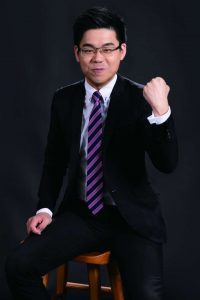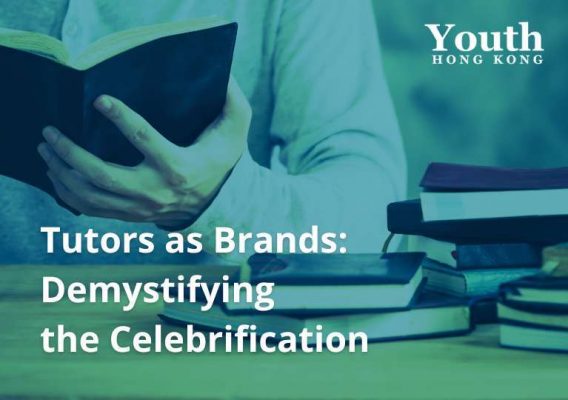//vol.15-2 Professionals’ Speak
Gwen Sin
The growing popularity of ‘‘celebrification’’ and how celebrities play such an important role even in the context of shadow education is an interesting topic for exploration. Youth Hong Kong speaks to one such ‘‘celebrity’’ tutor, Spencer Lam to gain better insight.
- Tutors being deemed as ‘celebrities’ in Hong Kong is interesting observation to note, as the definitions of becoming a celebrity are very vague.
- Celebrity tutor Spencer Lam shares his personal successes of helping students improve grades, as well as his unique teaching methods that caught up with the media exposure he receives subsequently.
- Private tutoring should continue to be viewed as supplementary and not be taken as the main priority in academic excellence.
- 香港補習界近年有個有趣的趨勢——導師經常會被視為「名人」這亦讓名人的定義變得模糊。
- 名人導師林栢勤分享他協助學生提升成績的成功經驗,以及他獨特的教學方法後,引來媒體爭相報道。
- 長遠而言,私人補習應擔當輔助學生的角色,而不應被視作追求優異成績的主要優先方法。
Previous studies on celebrity culture and celebrity endorsement focus on various individuals — such as the British Royal Family — up to ordinary people who earn their celebrity status via social media. Becoming a celebrity is easier nowadays, and include micro-celebrities whose fame rises through the Internet and social media.1
Academic journals defining what constitutes a celebrity are wider or sometimes vague, because any individual who is famous or well-known can be perceived as a celebrity nowadays.2 Other studies3 argue that public recognition and regular media exposure are keys to being considered a celebrity.

Local private tutor, Spencer Lam who runs his own tutoring practice with a team of more than 10 tutors specialising in gearing local students from the Hong Kong Diploma of Secondary Education Examination (HKDSE) to the International English Language Testing System (IELTS).
“I have been providing private part-time tutoring in English for the past 10 years in Hong Kong. Previously, I worked as a Management Trainee at an international bank. The satisfaction of helping my students excel helped me decide to take the pay cut and make the switch to full-time tutoring in 2019. From tutoring, I meet students across various age groups and academic levels. My experience as an English tutor has also given me a thorough understanding of the education system in Hong Kong and the challenges that students face in their academic pursuits.”
“Having taught more than 5,000 students in the past 10 years, and having taught most of them individually, I tailor my teaching approach to suit each student’s learning style and pace. Of course, I also conduct small group classes for some subjects, such as English writing. Small group classes allow students to learn from their peers and engage in group discussions.”
“As a private tutor, my personal goals are to help my students achieve their academic goals, improve their confidence and self-esteem, and develop a love for learning. While I wouldn’t consider myself a “celebrity” tutor, I have had several success stories. For example, I have had students who have improved from a C to an A grade within a few months of tuition, and others who have gone on to study at top universities in Hong Kong and overseas. These successes created a lot of hype and buzz about my unique teaching methods, and more than 11 media agencies have interviewed me to date.”
Proven by Unique Tutoring Methods, Not Marketisation
The commodification of education has unfortunately led schools and universities to treat education as a commodity in recent years, where tuition centres are run more for economic returns.4
Spencer argued further that it is not the marketisation of his tutoring skills that led his services to be highly sought after. “My tutoring methods are unique — I focus on developing a strong rapport with my students, understanding their needs and learning styles, and creating personalised learning plans with them. Various teaching techniques, such as visual aids, interactive activities, and real-life examples, are also adopted to make the learning process engaging and enjoyable for my students. As part of the active learning process, I encourage my students to ask questions, think critically, and develop their problem-solving skills. These techniques have proven effective in improving my students’ academic performance and fostering a love for learning.”
“As a private tutor, I can provide personalised attention and guidance to help students overcome difficulties and improve their understanding of the subject matter. Private tutoring also helps students to achieve the goal of scoring higher grades in their exams with targeted support and coaching to improve their performance. Students with specific learning needs or challenges, such as ADHD or dyslexia, can also benefit from private tuition as it can be tailored to their requirements and provide a more conducive learning environment,” Spencer elaborated.
The feedback I have received from both students and parents has been overwhelmingly positive, which reaffirms my belief that private tuition can make a significant difference in a student’s academic journey.
Private Supplementary Tutoring Remains Supplementary
The rise of tutoring centres engaging more aggressively in marketing activities, such as highly visible advertising placements on public transport and central districts in Hong Kong other than social media, nonetheless represent a novelty and is mostly still uncommon in other countries.
“It is noteworthy that private tutoring should not replace the efforts of the students and parents in studying and preparing for exams. Private tutoring should be viewed as a supplement to the efforts of the students and parents in achieving academic success,” concludes Spencer. ![]()
References:
- Khamis, S., Ang, L. and Welling, R., 2016. Self-branding, ‘micro-celebrity’ and the rise of social media influencers. Celebrity studies [online], 8(2), 191-208.
- Banister, E. N. and Cocker, H. L., 2014. A cultural exploration of consumers’ interactions and relationships with celebrities. Journal of Marketing Management [online]. 30(1-2), 1-29.
- Leslie, L. Z., 2011. Celebrity in the 21st century. Santa Barbara: ABC-CLIO
- Ricci, F. A., 2018. Marketisation of higher education: ethical and societal dilemmas In: Poff, C. and Michalos, A. C., eds. Encyclopaedia of Business and Professional Ethics [online], Springer International Publishing, 1-6.


